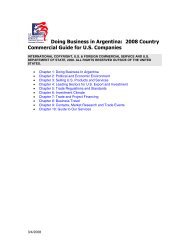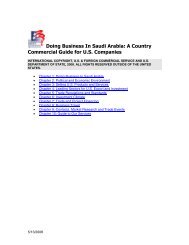Doing Business In (Insert Country Name Here) - BNA
Doing Business In (Insert Country Name Here) - BNA
Doing Business In (Insert Country Name Here) - BNA
Create successful ePaper yourself
Turn your PDF publications into a flip-book with our unique Google optimized e-Paper software.
The OECD Anti-Bribery convention is further enforced via amendments to the Tax Code<br />
and to the Code of Criminal Procedure. Article 39-2 of the French Tax Code puts an end<br />
to the tax deductibility of bribes as of the entry into force in France of the Convention<br />
(September 29, 2000). Finally, Article 706-1 of the amended Code of Criminal<br />
Procedure provides that acts criminalized by the OECD Convention will be prosecuted in<br />
the Economic and Financial Unit of the Paris Court of Justice.<br />
<strong>In</strong> July 2007, French Parliament approved the additional protocol to the Council of<br />
Europe's criminal convention on corruption.<br />
There have been no specific complaints from U.S. firms of unfair competition or<br />
investment obstacles due to corrupt practices in France in recent years. More<br />
information on the international fight against corruption can be found at the <strong>In</strong>ternet site<br />
of Transparency <strong>In</strong>ternational [http://www.Transparency.org]. According to<br />
Transparency <strong>In</strong>ternational’s French Chapter, the sectors most affected by corrupt<br />
practices tend to be public works and the defense industry.<br />
Bilateral <strong>In</strong>vestment Agreements Return to top<br />
1959 U.S.-France Convention on Establishment<br />
U.S. investment in France is subject to the provisions of the Convention on<br />
Establishment between the United States of America and France, which was signed in<br />
1959 and is still in force. Some of the rights it provides to U.S. nationals and companies<br />
include:<br />
-- The right to be treated like domestic nationals in all types of commercial activities<br />
including the right to establish offices and acquire majority control of French firms, and in<br />
obtaining and maintaining patent and trademarks. (This right does not apply to firms<br />
involved in communications, air transportation, water transportation, banking, the<br />
exploitation of natural resources, certain "professions," and the production of electricity);<br />
-- The right to receive the best treatment accorded to either domestic nationals and<br />
companies or third country nationals and companies with respect to transferring funds<br />
between France and the U.S.,<br />
-- The requirement that property may only be expropriated for a public purpose and that<br />
payment must be just, realizable and prompt.<br />
The treaty does not apply to the use or production of fissionable materials, arms or any<br />
materials that are used directly or indirectly to supply military establishments. The treaty<br />
does not prevent application of measures necessary to protect essential security<br />
interests.<br />
Bilateral <strong>In</strong>vestment Treaties<br />
<strong>In</strong>vestments in France by other EU member states are governed by the provisions of the<br />
Treaty of Rome and by Union Law. France has also signed Bilateral <strong>In</strong>vestment Treaties<br />
(BITs - “Accords de protection et d’encouragement réciproques des investissements”)<br />
with the following 85 countries: Albania, Algeria, Argentina, Armenia, Azerbaijan,<br />
2/15/2008 <strong>Country</strong> Commercial Guide for France 115<br />
INTERNATIONAL COPYRIGHT, U.S. & FOREIGN COMMERCIAL SERVICE AND U.S. DEPARTMENT OF STATE,<br />
© 2007. ALL RIGHTS RESERVED OUTSIDE OF THE UNITED STATES.












